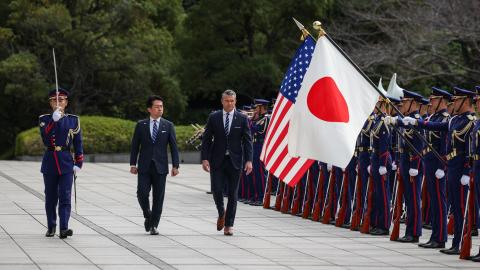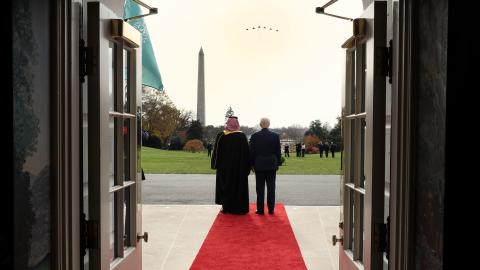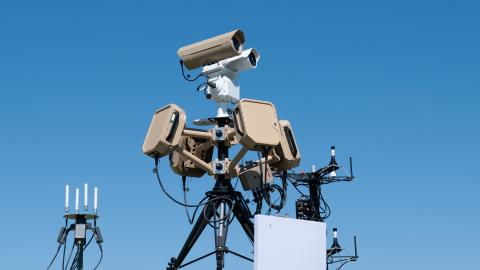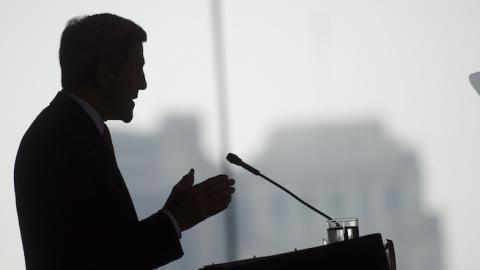Guess who's not part of the White House's Iran deal "echo chamber"? Yep, Qassem Suleimani. The head of the Islamic Revolutionary Guard Corps' Quds Force thinks Iran and America aren't poised for realignment, but rather are at war. And Iran, he says, is thrashing the great Satan. "Iran relied on logic during its confrontation with the U.S. and benefited from its enemies' mistakes," Suleimani said in a speech yesterday. "Iranian support [of the Assad regime] forced America to back down from its goals in Syria."
What an ingrate! The White House frees up tens of billions of dollars so the Iranians can continue helping Assad wage his murderous campaign of sectarian cleansing in Syria, and Tehran's Mr. Fix-It turns around and rubs it in the administration's face. The only alternative to the nuclear deal, said the White House and its various friends in the media, academy, and think-tank community, is war. Wrong, says Suleimani, there's only war. It looks like the IRGC's external operations unit is not getting the Ploughshares talking points.
Last week, the Associated Press reported that the Ploughshares Fund gave financial support to media outlets, including National Public Radio, as part of its efforts to support the White House's nuclear deal with Iran. According to Ploughshares' 2015 annual report, the organization gave NPR $100,000 to help it report on the nuclear deal and related issues in 2015. Reports elsewhere indicate that the foundation has given NPR $700,000 over the last decade.
Both NPR and Ploughshares argue that the grant didn't affect reporting the agreement. "We have a rigorous editorial firewall process in place to ensure our coverage is independent and is not influenced by funders or special interests," the partially publicly supported media outlet claimed. Funding, Ploughshares' spokeswoman Jennifer Abrahamson told the AP, "does not influence the editorial content of their coverage in any way, nor would we want it to."
This is ridiculous. If Ploughshares didn't want to influence the editorial content in line with its mission—to "build a safe, secure world by developing and investing in initiatives to reduce and ultimately eliminate the world's nuclear stockpiles"—it would rightly have to answer to its own financial backers for wasting their money. It's clear from other internal Ploughshares documents, in fact, that the fund closely tracks whether it's getting its money's worth from directly funding the media.
In 2014 Ploughshares commissioned a "Cultural Strategy Report" describing how the fund could use Hollywood, radio, journalists, and even video games to push its agenda. A section on how to provide money to journalists acknowledges "we understand that similar efforts supported by Ploughshares Fund in the past did not generate the desired volume of coverage (funding of reporters at The Nation and Mother Jones and a partnership with the Center for Public Integrity to create a national security desk)." Note that NPR is not mentioned, and how $100,000 was transferred to NPR in 2015, as it had been most years over the past decade.
Since David Samuels' controversial profile of Obama lieutenant Ben Rhodes was published in the New York Times Magazine two weeks ago, a map of what Rhodes called the echo chamber has begun to emerge. Ploughshares, as Rhodes noted, was among those individuals and organizations who "were saying things that validated what we had given them to say" about the nuclear deal. And to ensure the cycle of mutually assured validation, Ploughshares supported others to keep them everyone on message. It wasn't just NPR, or experiments with Mother Jones and the Nation.
It's now been reported that funds were also distributed to an Iranian former nuclear negotiator teaching at Princeton (Reuel Marc Gerecht wrote about him here); research organizations and think-tanks, like the Brookings Institution, the Atlantic Council, and the Arms Control Association; to a range of communitarian interest groups, lobbies and faith based organizations like J Street, the National Iranian American Council, and Friends Committee on National Legislation, which calls itself a "Quaker Lobby in the Public Interest"; even to an email listserv, Gulf 2000, that disseminated Iran deal talking points, as well as conspiracy theories, to policymakers, analysts, and journalists, including Iran deal advocates like Al-Monitor journalist Laura Rozen and Ploughshares President Joe Cirincione.
As Rhodes explained to Samuels, he saw the echo chamber, a "far-reaching spin campaign," as the only way to conduct the nuclear agreement with Iran. "I mean, I'd prefer a sober, reasoned public debate, after which members of Congress reflect and take a vote," said Rhodes. "But that's impossible."
But it was the echo chamber that made public debate impossible. That was its purpose.
According to the echo chamber, no critic or opponent of the Iran deal was operating in good faith. They were all liars or warmongers, or disloyal and bought by a foreign government. The White House and its media surrogates trafficked in plainly anti-Semitic conceits to intimidate opponents, like leaders in the American Jewish community and even lawmakers from the president's own party, like senators Charles Schumer and Robert Menendez.
But perhaps the clearest illustration of how the administration and its allies waged its campaign comes from a report published by the Institute for Science and International Security, a non-profit organization headed by David Albright, a physicist who among other distinctions cooperated with the IAEA's Action Team from 1992-1997. Albright and his organization were not opposed to a negotiated agreement to halt Iran's nuclear weapons program, but made themselves inconvenient because they consistently made recommendations about how to close loopholes the Iranians might exploit in the future. And so the echo chamber went to work. An excerpt from ISIS' 2014 report, "Iran's Stock of near 20 Percent LEU under the Extension of the Joint Plan of Action" describes the echo chamber at work:
Several media outlets and groups, including Al Monitor, Arms Control Association (ACA), and the National Iranian American Council (NIAC) have omitted this aspect of the story in their reporting on the extension agreement. For example, ACA and Al Monitor both stated, "Iran will convert 35 additional kg of its [ACA stated Iran's] remaining 75 kg of 20% oxide into reactor fuel," without discussing the large fraction of near 20 percent LEU that has not ended up in fuel assemblies. NIAC did the same in a policy memo with a few more words added for clarity's sake and made more mistakes in its reporting on the extension. These groups have little in-house technical expertise and thus should avoid making snap judgments without the added background of technical analysis. However, this explanation does not completely explain the errors and omissions. The information about the TRR fuel is readily available in International Atomic Energy Agency reports and each of these groups analyzes to some extent these reports. In addition, although perhaps not intentionally due to the confusion over the provisions, these groups also mistakenly reported on the limitations in the November extension agreement, incorrectly describing additional monitoring as "snap" inspections and misunderstanding limitations on the IR-6 centrifuge.
But as another problem, there appears to be groupthink going on among some of these and other groups leading to a willingness to uncritically and unwaveringly support the interim deal and defensively react to any compliance questions. In the past, at least, individuals from these three groups in particular participated in a Ploughshares Fund sponsored Iran listserv that shared and shaped positions on addressing the Iranian nuclear issue in the media and in analysis. Based on ISIS staff's experience as participants on this listserv a few years ago, this shaping too often devolved into poor analysis. ISIS first attempted to improve and correct analysis, and then ISIS staff decided to remove themselves from the listserv. It is unclear if the groupthink element and one-sided shaping are happening here, or if the listserv still exists, but it is worth asking.
Ploughshares believes that silencing critics of a flawed nuclear agreement and filling the public sphere with incomplete or false information is heroic. In the organization's 2015 annual report, board chairwoman Mary Lloyd Estrin wrote of "the absolutely critical role that civil society played in tipping the scales towards this extraordinary policy victory." It's perhaps not surprising that Ploughshares confuses the people and institutions it supports with the public sphere, but in this case at least it's precisely the opposite.
Civil society is the assortment of institutions, like the media, the academy, non-governmental organizations, etc. that exist apart from and frequently in opposition to the government in order to express the will of the citizens of a free society. Its purpose is to inform those citizens so they are better equipped to make decisions about their lives and the life of the nation and thereby hold their government accountable.
But Ploughshares conscripted journalists, researchers, and NGOs to do the opposite, and to promote what everyone acknowledges was the Obama administration's most fundamental second term agenda item, what Rhodes once described as the foreign policy equivalent of Obamacare. What Ploughshares did was to pollute the public sphere with self-validated and self-validating noise for the purpose of deceiving the public on behalf of the state. It seems that for the Ploughshares Fund, the highest form of patriotism is manufacturing consent.
If the White House threatened to punish Democrats tempted to challenge the deal, Ploughshares helped lawmakers feel better about caving in. They paid for think tanks to produce incomplete or erroneous factsheets, they paid for journalists to publish it, and they paid for lobbyists to carry it to Capitol Hill.
Still, Rhodes may be giving Ploughshares too much credit. The president of the United States usually gets his way in foreign affairs. Ploughshares' spirited push-back against right-wing institutions like the New York Times Magazine and the Associated Press is perhaps best seen as a fund-raising campaign: Sign on with the winners who helped the White House win.
As we are starting to see now, the echo chamber wasn't just a political instrument used to win a policy debate. It is also the manifestation of a political sensibility of an administration whose spirit of governance is fueled by contempt and paranoia.
Neither the White House nor the Ploughshares Fund believes that it endangered democratic society by corrupting the public sphere. No, they preserved it by helping to shut out one side. You can't have a rational debate, said Rhodes. And that's because the people who most threaten your peace, prosperity, and liberty are those you share a country with. It's because the gravest danger you face is not an Iranian terrorist who says he is at war with you, but your neighbor who votes differently than you.

















